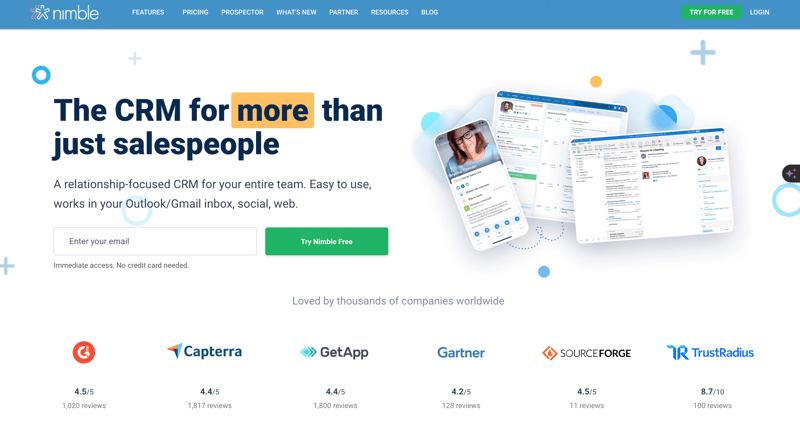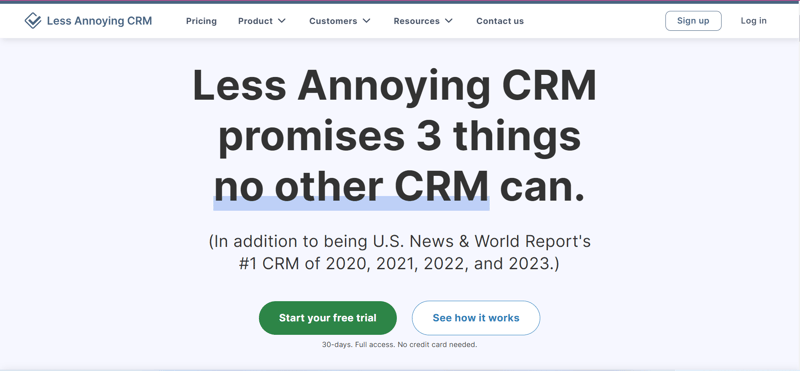
13 Best Contact Management Software (2026)
 Updated on
Updated on
 By Rob Marquez
By Rob Marquez
Rob Marquez
Originally from Southern California, Rob moved to Denver over 4 years ago to join the Ringy team as a Mobile Engineer. Rob received his BS and MS in C...
learn more
Rob Marquez
Originally from Southern California, Rob moved to Denver over 4 years ago to join the Ringy team as a Mobile Engineer. Rob received his BS and MS in C...
Table of Contents
Table of Contents
Keeping track of customers used to mean a desk covered in sticky notes, a spreadsheet with way too many tabs, and the occasional "Did I ever email that prospect back?" panic.
Thankfully, those days are long gone. Contact management has grown up, and the best contact management software now gives sales teams a smarter way to organize, track, and actually act on customer data.
In 2026, the options go far beyond a glorified address book. The right tool can sync across apps, keep your pipeline in check, and even spot opportunities you might miss when juggling leads by hand. The tricky part? There are so many platforms promising to do it all that choosing one can feel like another full-time job.
But it doesn't have to be because we've rounded up the 13 best contact management software solutions worth your attention this year. We'll cover everything from sleek apps built for small businesses to powerhouse systems designed for scaling sales teams.
By the end, you'll know exactly which tools deserve a place in your stack and which ones you can cross off the list.
Top 13 Best Contact Management Software Tools (2026 Review)
With so many contact management tools available, finding the right fit comes down to your business size, workflow style, and sales goals. To save you time, here's a quick side-by-side table of the best contact management software in 2026 and what each does best:
*Note: All pricing details are accurate as of August 2026*
|
Software |
Best For |
Key Features |
Pricing |
|
Sales professionals seeking automation + CRM in one platform |
SMS/call/email logging, drip campaigns, pipeline dialing, lead vendor integrations |
$119/month |
|
|
Teams needing free, scalable tools with marketing built in |
Contact insights, email tracking, pipeline dashboards, HubSpot ecosystem |
Free plan available; paid from $15/user/month |
|
|
Small teams on a budget |
Task management, contact sharing, integrations with Zoho apps |
Starts at $14/user/month |
|
|
Growing sales teams needing scalability |
Customizable dashboards, automation, app marketplace |
Starts at $25/user/month |
|
|
Visual pipeline management |
Drag-and-drop pipelines, activity reminders, AI insights |
Starts at $24/user/month |
|
|
Keap (formerly Infusionsoft) |
Solopreneurs needing automation + CRM |
Email campaigns, payments, client management |
Starts at $299/month |
|
Social-media driven contact enrichment |
Social profile matching, smart contact records, pipeline tracking |
$29.90/user/month |
|
|
Simplicity and low cost |
Basic CRM features, unlimited contacts, email logging |
$15/user/month |
|
|
Sales teams that live on the phone |
Built-in calling, SMS, power dialer, email automation |
Starts at $49/user/month |
|
|
Google Workspace users |
Gmail + Google Calendar integration, simple pipelines |
Starts at $12/user/month |
|
|
Basic CRM and contact database needs |
Email marketing, calendar, pipeline tracking |
Starts at $19.99/month |
|
|
SMBs seeking AI-powered CRM |
Freddy AI assistant, lead scoring, omnichannel engagement |
Free plan available; paid from $11/user/month |
|
|
Gmail-based sales pipelines |
Manage contacts inside Gmail, pipeline views, integrations |
Plans start from $59/user/month |
1. Ringy

Best for: Sales professionals seeking automation + CRM in one platform
Ringy is more than just contact management software—it's a full CRM solution designed with sales productivity in mind. It streamlines lead management, communication, and pipeline tracking so you can spend less time shuffling through tools and more time closing deals.
Top Features:
- SMS, Call, and Email Logging: Keep all conversations in one place for complete contact history.
- Drip Campaigns: Automate follow-ups and nurture leads without manual effort.
- Integrations: Connect Ringy with your lead sources to streamline inbound leads.
- Call Tracking & Local Presence: Track call outcomes while boosting connection rates with local caller ID.
- Pipeline Dialing: Queue up calls directly from your sales pipeline for efficiency.
Pros:
- All-in-one platform with automation and CRM
- Affordable compared to most competitors
- Easy onboarding with full support
Cons:
- Best suited for sales-focused teams (may feel CRM-heavy for simple contact management needs)
Pricing: Flat rate pricing of $119/month for unlimited users.
2. HubSpot CRM

Best for: Teams needing free, scalable tools with built-in marketing
HubSpot CRM is one of the most popular free contact management systems, offering robust features even at the entry level. Its seamless integration with HubSpot's marketing, sales, and customer service tools makes it a strong choice for growing teams.
Top Features:
- Free CRM Core: Includes contact records, deals, and pipelines.
- Contact Insights: Automatically pulls in company and contact details.
- Email Tracking and Templates: See when prospects open emails.
- Pipeline Dashboards: Visualize deal stages with drag-and-drop simplicity.
- HubSpot Ecosystem: Expand into marketing, service, and operations hubs as needed.
Pros:
- Generous free plan
- Highly scalable with advanced HubSpot hubs
- Strong integration ecosystem
Cons:
- Advanced features can get pricey
- Some automation locked behind higher tiers
Pricing: Free plan available but paid plans start at $15/user/month.
3. Zoho ContactManager

Best for: Small teams on a budget
Zoho ContactManager is a lightweight option from the Zoho suite, designed for startups and small businesses that don't need all the complexity of a full CRM. It's budget-friendly while still offering essential contact management tools.
Top Features:
- Centralized Contacts: Keep all contact details in one place.
- Task Management: Assign tasks and track follow-ups.
- Contact Sharing: Collaborate with team members easily.
- Zoho Integrations: Works with Zoho Mail, Zoho Books, and other apps.
Pros:
- Very affordable
- Easy to use and adopt
- Integrates smoothly with Zoho apps
Cons:
- Limited advanced CRM features
- Best for very small teams
Pricing: Starts at $14/user/month.
4. Salesforce CRM

Best for: Growing sales teams needing scalability
Salesforce Essentials brings the power of Salesforce down to a package designed for small businesses. It delivers robust CRM and contact management features with room to grow into Salesforce's full ecosystem.
Top Features:
- Customizable Dashboards: Tailor reporting to your needs.
- Task and Event Tracking: Stay on top of sales activities.
- Automation Tools: Automate workflows for efficiency.
- App Marketplace: Extend functionality with third-party apps.
Pros:
- Scales as your team grows
- Reliable brand with enterprise-grade tools
- Extensive customization options
Cons:
- Steeper learning curve
- More complex than lightweight tools
Pricing: Starts at $25/user/month.
5. Pipedrive

Best for: Visual pipeline management
Pipedrive is a sales-focused CRM with a clean, visual pipeline view. It's perfect for sales managers who want simplicity without sacrificing functionality.
Top Features:
- Drag-And-Drop Pipelines: Move deals easily between stages.
- Activity Reminders: Stay on top of follow-ups.
- Email Sync: Keep communications tied to contacts.
- AI-Powered Sales Assistant: Get insights and recommendations.
Pros:
- Extremely user-friendly
- Great for visual learners
- Affordable entry pricing
Cons:
- Lacks deep marketing tools
- Some features require add-ons
Pricing: Starts at $24/user/month.
6. Keap (formerly Infusionsoft)

Best for: Solopreneurs needing contact + marketing automation
Keap blends CRM, contact management, and marketing automation in one. It's a strong option for solo business owners or small teams who want to automate without juggling multiple tools.
Top Features:
- CRM + Contact Database: Manage leads and clients in one place.
- Email Campaigns: Automate customer nurturing.
- Appointment Booking: Schedule meetings directly.
- Payments and Invoicing: Collect payments inside the platform.
Pros:
- Strong automation features
- Great for service-based solopreneurs
- Includes payments and scheduling
Cons:
- Expensive for small businesses
- Steeper setup process
Pricing: Starts at $299/month.
7. Nimble

Best for: Social media-driven contact enrichment
Nimble is designed to give you rich, contextual insights on your contacts by connecting with social networks. It automatically builds smart profiles for stronger customer relationships.
Top Features:
- Social Profile Matching: Enrich contact details from social media.
- Smart Contact Records: Automatically update contact data.
- Pipeline Tracking: Manage deals in a simple interface.
- Browser Extensions: Pull contact info from anywhere online.
Pros:
- Excellent social integrations
- Affordable pricing
- Smart, automated data enrichment
Cons:
- Limited reporting features
- Smaller app ecosystem compared to larger CRMs
Pricing: $29.90/user/month.
8. Less Annoying CRM

Best for: Simplicity and low cost
Less Annoying CRM lives up to its name. It strips away unnecessary features to deliver a simple, affordable contact management system that small businesses can use right away.
Top Features:
- Unlimited Contacts: No restrictions on database size.
- Simple Pipelines: Track deals without complexity.
- Calendar and Task Management: Stay organized with follow-ups.
- Email Logging: Attach email history to contact records.
Pros:
- Very affordable at a flat monthly rate
- Easy to use with minimal training
- Unlimited users on one plan
Cons:
- No advanced automation
- Limited integrations
Pricing: $15/user/month.
9. Close

Best for: Sales teams that live on the phone
Close is a CRM designed for inside sales teams, with a heavy focus on calling and SMS. It's perfect for teams that want built-in calling tools without extra integrations.
Top Features:
- Built-In Calling: Make calls directly from the CRM.
- SMS Support: Text leads and customers at scale.
- Power Dialer: Increase call volume with automated dialing.
- Email Automation: Sequence campaigns for follow-ups.
Pros:
- Excellent for phone-heavy sales teams
- All-in-one communication hub
- Strong reporting features
Cons:
- More expensive than some alternatives
- May be overkill for teams not focused on calls
Pricing: Starts at $49/user/month.
10. Copper

Best for: Google Workspace users
Copper integrates seamlessly with Gmail and Google Calendar, making it the go-to CRM for businesses already deep in the Google ecosystem.
Top Features:
- Native Gmail Integration: Manage contacts and pipelines directly from Gmail.
- Google Calendar Sync: Track meetings and tasks.
- Pipeline Management: Simple drag-and-drop interface.
- Workflow Automation: Reduce manual tasks with rules.
Pros:
- Perfect for Google Workspace users
- Minimal learning curve
- Clean, modern interface
Cons:
- Limited outside Google ecosystem
- Less customizable than larger CRMs
Pricing: Starts at $12/user/month.
11. BigContacts

Best for: Basic CRM and contact database needs
BigContacts is a simple, straightforward CRM designed for small teams who want a shared contact database without complex features.
Top Features:
- Contact Database: Store and share all customer information.
- Email Marketing Tools: Send campaigns directly.
- Calendar and Reminders: Keep track of meetings.
- Pipeline Tracking: Monitor opportunities in real time.
Pros:
- Very affordable
- Easy-to-use interface
- Combines CRM + email marketing
Cons:
- Limited advanced features
- Interface feels a bit dated
Pricing: Starts at $19.99/month.
12. Freshsales

Best for: SMBs seeking AI-powered CRM features
Freshsales, part of Freshworks, is designed for small and medium-sized businesses that want smart, AI-enhanced sales tools without the enterprise price tag.
Top Features:
- Freddy AI Assistant: Provides insights and recommendations.
- Lead Scoring: Prioritize leads based on engagement.
- Omnichannel Communication: Connect via phone, email, and chat.
- Workflow Automation: Reduce repetitive work.
Pros:
- AI-powered insights
- Free plan available
- Great value for SMBs
Cons:
- AI features limited on lower tiers
- Can get complex for very small teams
Pricing: Free plan available; paid plans start at $11/user/month.
13. Streak

Best for: Gmail-based sales pipelines
Streak lives inside Gmail, turning your inbox into a lightweight CRM and contact management app. It's ideal for freelancers, solopreneurs, and small sales teams.
Top Features:
- Pipeline Views Inside Gmail: Manage deals without leaving your inbox.
- Email Tracking: Know when contacts open messages.
- Mail Merge: Send personalized bulk emails.
- Integrations: Connect with Google Workspace tools.
Pros:
- Works seamlessly in Gmail
- Great for freelancers and small teams
- Easy to set up and use
Cons:
- Not ideal for larger teams
- Limited customization compared to full CRMs
Pricing: Free plan available; paid plans start at $59/user/month.
Main Benefits of Sales Contact Management Software

The best contact management software isn't just about storing names and numbers—it helps sales teams work smarter, avoid mistakes, and connect with prospects more effectively. Here's a quick summary of the core benefits:
|
Benefit |
Description |
|
Eliminating Errors From Duplicate Entries |
Prevents duplicate data, saves time on entry, and ensures clean, accurate records. |
|
Drive SMS Campaigns |
Enables error-free, automated SMS outreach with higher open rates than email. |
|
Access All Contacts From a Central Dashboard |
Provides a single database for quick access to contact info and insights. |
|
Track Customer Interactions Across All Channels |
Consolidates calls, emails, texts, and more into one unified timeline. |
1. Eliminating Errors From Duplicate Entries
Duplicate data can harm your business because it doesn't enable you to track communications with your prospects effectively.
If you have a duplicate entry, a sales team member can reach out to that prospect and set themselves up for failure because they relied on redundant information.
32% of sales reps say they spend too much time on data entry. Imagine the additional time that goes into cleaning data to ensure it is meaningful.
Yes, you have spreadsheet formulas to address duplicate data. But it takes ages, and it isn't something your average Excel user wants to spend their time on. It's just not efficient.
We haven't even considered that you can accidentally delete important information while cleaning the data manually.
And while the undo function isn't always there to save you, you can rest assured a sales contact management software will be there to stop you from tripping over errors due to duplicate or incorrect entries.
Two more things about the best contact management software:
- You can look forward to more advanced segmenting features that'll empower you to fine-tune your outreach campaigns.
- You can say goodbye to manual data entry – automation sequences and handy shortcuts will finally be on your side, enabling you to quickly save all the details you need.
2. Drive SMS Campaigns

Compared to the 20% open rate of email campaigns, the average open rate for an SMS campaign can reach up to 98%.
Wow, right?
Well, wait until we tell you that SMS campaigns are also very affordable and increase customer engagement than most marketing channels!
But what does this have to do with contact management software?
Simple: a reliable contact management tool is one of the most important tools for maximizing the results of an SMS campaign.
Alongside the right messaging and powerful marketing automation.
A sales contact management software helps you send texts to as many prospects as possible and frees you from having to bother about errors like:
- Typos
- Incorrect contact details
- Forgetting to send the message at the right moment
Plus, setting up your SMS campaign will only take a few clicks – talk about a win, win situation.
Pro tip: set up seasonal texts and welcome messages to help set the tone for future communications with contacts at the beginning of the sales funnel.
3. Access All Your Contacts From a Central Dashboard
Being able to access all of your prospects' contact information enables you to extract valuable insights that can help you fine-tune and optimize your marketing strategy.
Pretty important, right?
And that's why the best contact management software provides you with a central database where you can track and monitor contacts' data.
Just open it, perform a quick search, and you'll have the right information on your screen.
P.S. Some contact management software (like ours) also acts as an all-in-one call center – perfect for helping sales reps connect with prospects faster to make and close more deals.
4. Track Your Customer Interactions Across All Channels
It's 2026, and you're bound to end up interacting with prospects across several channels. It's an inevitable fact of life. Be it a phone call, an SMS, a Facebook message, or an email.
So what are you going to do?
- Force your prospects to only communicate on one channel?
- Use multiple channels and go crazy managing the multiple platforms that don't communicate with each other?
- Invest in contact management tools with omnichannel communication and data collection?
The third one.
How to Choose the Right Contact Management Software (Key Criteria)

Choosing the best contact management software means considering how well the tool fits your workflow and helps your team stay productive. Before you commit to one platform, here are the key factors to evaluate so you can find a solution that balances ease of use, automation, and scalability.
1. Contact Syncing
Your contacts live in email, calendars, phones, forms, and spreadsheets. The best contact management software keeps them in one clean record without duplicates. Look for true two-way syncing with the platforms you already use, field mapping for custom data, conflict resolution rules, and automatic deduplication.
Mobile matters too. The best contact management apps should sync instantly, work offline, and respect role-based permissions so reps see what they need and nothing they don't.
If you're comparing the best contact management system options, check for CSV import wizards, data enrichment, and clear "source of truth" tagging so you know where each field came from.
2. Communication Logging
Sales contact management software shines when every touch is captured without nagging reps. Prioritize automatic email logging via OAuth or BCC, native call and SMS logging, and integrations for meetings and messaging.
A unified timeline per contact should stitch emails, calls, texts, meetings, notes, and attachments together, with search that actually finds things. Call recordings or transcripts are a bonus; so are compliance features like consent tracking. The goal: a complete history you can trust when you open a record minutes before a call.
3. Automation
Automation turns good contact management tools into quiet teammates. Evaluate triggers such as "new contact," "email reply," or "status changes," then build workflows that assign owners, start drip campaigns, create tasks, or move deals forward.
For small teams, prebuilt templates save hours. For larger teams, look for visual builders, conditional logic, and reusable snippets. Lead scoring, SLA reminders, and round-robin assignment keep follow-ups consistent so prospects never slip through the cracks.
4. Integration Capabilities
Contacts touch every system. The best contact management software for small business should offer click-and-go integrations with email, calendars, calling, chat, forms, e-signature, accounting, and marketing tools. For scale, look for open APIs, webhooks, and connectors like Zapier or Make.
Check depth, not just logos. Does the integration sync custom fields, activities, and ownership, or just names and emails. Security matters too. SSO, SCIM user provisioning, and audit logs help as your team grows.
5. Pipeline Management
Choose a platform where contacts link cleanly to organizations, opportunities, and activities. Visual pipelines with drag-and-drop stages keep managers sane and reps focused. Multiple pipelines support different motions like new business and renewals.
Helpful extras include stage probability, activity goals, and service-level timers. If you sell by phone, prioritize power dialers and queue-based calling inside the pipeline to shorten follow-up cycles.
6. Analytics and Reporting
Strong reporting should show contact sources, funnel conversion, time-to-first-touch, activity volume by rep, and revenue attribution. Saved dashboards help managers spot risks early. Export options let you run deeper analysis, or even build your own internal contact management software ratings based on adoption, speed-to-response, and conversion.
For small teams, starter dashboards are enough; as you scale, custom reports and scheduled email digests save hours.
7. Onboarding and Support
This is where the best small business contact management software separates itself. Look for guided imports, free onboarding sessions, live chat, weekend coverage, and a searchable help center. Training tracks for admins and reps speed up time-to-value.
As your needs evolve, you'll want configurable roles, field-level permissions, and sandbox or trial environments to test changes safely. If you expect to grow, ask about customer success resources and migration support from your old system.
Time To Turn Your Contact List Into a Goldmine
Still thinking about managing your contacts with spreadsheets?
Yeah, we thought so too.
And how could you go back to spreadsheets after seeing the wonders that contact management software can help you achieve?
The best contact management software does more than manage your contacts. It helps you hack your contacts' list, maximizing the amount of information you have at your fingertips and helping you close more sales.
Ringy is the best choice for you to enhance your contact management and drive your sales campaigns efficiently.
Book a demo today and make managing your contacts a piece of cake.

Skyrocket your sales with the CRM that does it all.
Calling? Check. SMS? Check. Automation and AI? Check. Effortlessly keep in touch with your customers and boost your revenue without limits.

Take your sales to new heights with Ringy.
Sales in a slump? Ringy gives you the tools and flexibility you need to capture leads, engage with them, and turn them into customers.
Subscribe to Our Blog
Enter your email to get the latest updates sent straight to your inbox!
Categories
Related Articles













.jpg)




.jpg)


.jpg)

















































